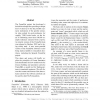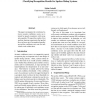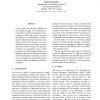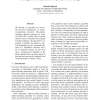ACL
2003
14 years 2 months ago
2003
We have been investigating an interactive approach for Open-domain QA (ODQA) and have constructed a spoken interactive ODQA system, SPIQA. The system derives disambiguating querie...
ACL
2003
14 years 2 months ago
2003
In every text, some words have frequency appearance and are considered as keywords because they have strong relationship with the subjects of their texts, these words frequencies ...
ACL
2003
14 years 2 months ago
2003
The FrameNet project has developed a lexical knowledge base providing a unique level of detail as to the the possible syntactic realizations of the specific semantic roles evoked...
ACL
2003
14 years 2 months ago
2003
This paper describes a spoken dialog QA system as a substitution for call centers. The system is capable of making dialogs for both fixing speech recognition errors and for clari...
ACL
2003
14 years 2 months ago
2003
In this paper, we elucidate how Korean temporal markers, OE and DONGAN contribute to specifying the event time and formalize it in terms of typed lambda calculus. We also present ...
ACL
2003
14 years 2 months ago
2003
This paper investigates the correlation between acoustic confidence scores as returned by speech recognizers with recognition quality. We report the results of two machine learni...
ACL
2003
14 years 2 months ago
2003
In this paper, we present a method for the semantic tagging of word chunks extracted from a written transcription of conversations. This work is part of an ongoing project for an ...
ACL
2003
14 years 2 months ago
2003
We describe an algorithm for recovering non-local dependencies in syntactic dependency structures. The patternmatching approach proposed by Johnson (2002) for a similar task for p...
ACL
2003
14 years 2 months ago
2003
Discourse chunking is a simple way to segment dialogues according to how dialogue participants raise topics and negotiate them. This paper explains a method for arranging dialogue...
ACL
2003
14 years 2 months ago
2003




